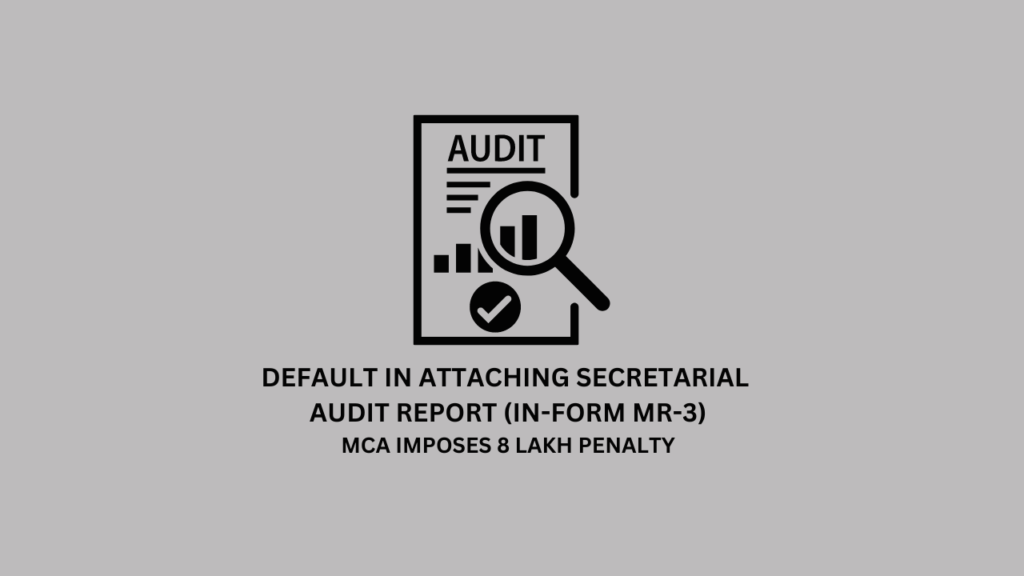
The MCA recently fined Zyden Gentec Limited ₹8 Lakh for willfully violating Section 204(1) of the Companies Act, 2013 by not following its rules. According to Rule 9 of the Companies (Appointment and Remuneration of Managerial Personnel) Rules 2014, the company was in violation when it failed to attach the Secretarial audit report (in form MR-3) for the fiscal years 2015–16 and 2016–17. This article offers a thorough examination of the infraction, the decision-making procedure, and the fines levied by the Rajasthan, Jaipur, Registrar of Companies.
The case centers on the finding that Zyden Gentec Limited failed to attach the Secretarial audit report (in form MR-3) for the fiscal years 2015–16 and 2016–17 in accordance with Section 204(1) of the Companies Act, 2013. According to Rule 9 of the Companies (Appointment and Remuneration of Managerial Personnel) Rules 2014, the company’s applicability was the reason for this failure.
Every listed company, public company with paid-up share capital of fifty crore rupees or more, and public company with turnover of two hundred crore rupees or more are required by Section 204(1) of the Companies Act, 2013 to append a secretarial audit report to its Board’s report, which is prepared in compliance with subsection (3) of Section 134 of the Companies Act, 2013. As required by the applicable Rule, this report must be submitted in form MR-3 and must be delivered by a company secretary in practice.
On April 25, 2022, the firm and its directors received a show-cause notice from the office of the Registrar of Companies. Nevertheless, the firm failed to reply to this notice, demonstrating a breach of Section 204(1) of the Companies Act, 2013. An adjudication notice dated June 30, 2022 was then sent to the corporation and its officers, alleging a violation of Section 204(1). This notice gave them the chance to appear for a hearing at the Jaipur office of the Registrar of Companies on July 15, 2022. Owing to the representatives’ non-attendance on this particular date, a hearing was rescheduled for September 16, 2022.
An adjudication notice dated June 30, 2022 was then sent to the corporation and its officers, alleging a violation of Section 204(1). This notice gave them the chance to appear for a hearing at the Jaipur office of the Registrar of Companies on July 15, 2022. Owing to the representatives’ non-attendance on this particular date, a hearing was rescheduled for September 16, 2022. Nevertheless, neither the corporation nor its directors made an appearance on either of the hearing days, and the default remained uncorrected. It was therefore determined that the company’s directors and KMPs were in default.
Nevertheless, neither the corporation nor its directors made an appearance on either of the hearing days, and the default remained uncorrected. It was therefore determined that the company’s directors and KMPs were in default.
The Registrar of Companies found that Zyden Gentec Limited and its directors had in fact broken Section 204(1) of the Companies Act, 2013 after carefully reviewing the relevant facts. The Registrar of Companies issued an adjudication order imposing the following penalties in response to this violation:
The failure to attach the Secretarial audit report (in form MR-3) for the fiscal years 2015–16 and 2016–17 resulted in the imposition of these penalties. This order was signed on October 11, 2022, as the final resolution of the dispute.
CONCLUSION
The Zyden Gentec Limited case serves as a reminder of how crucial it is to follow legal obligations, such as the Companies Act of 2013’s requirement that the Secretarial audit report (in form MR-3) be attached. As demonstrated in this instance, there may be severe financial penalties for noncompliance with such rules. It acts as a warning to businesses about the importance of strictly adhering to all regulatory requirements in order to avoid serious legal repercussions.








